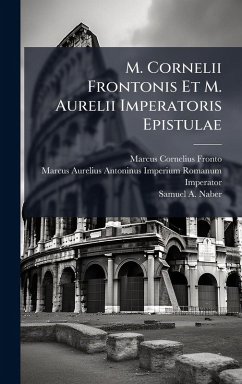This volume contains the collected letters of Marcus Cornelius Fronto and Marcus Aurelius, offering a fascinating glimpse into the intellectual and political life of the Roman Empire in the 2nd century CE. Included are letters from Lucius Verus, Antoninus Pius, and fragments of Appian's correspondence. The text is meticulously compiled and edited by G. N. Du Rieu, building upon the work of Angelo Mai and incorporating collations from the Ambrosian and Vatican codices. These letters provide invaluable insights into the personal relationships, philosophical inclinations, and administrative concerns of key figures during the reigns of the Antonine emperors. Of particular interest are the exchanges between Fronto, a renowned rhetorician, and his pupil Marcus Aurelius, later emperor, which reveal the development of Aurelius' Stoic philosophy and his approach to governance. This edition is an essential resource for scholars of Roman history, Latin literature, and classical philosophy, preserving a vital record of Roman intellectual life. This work has been selected by scholars as being culturally important, and is part of the knowledge base of civilization as we know it. This work was reproduced from the original artifact, and remains as true to the original work as possible. Therefore, you will see the original copyright references, library stamps (as most of these works have been housed in our most important libraries around the world), and other notations in the work. This work is in the public domain in the United States of America, and possibly other nations. Within the United States, you may freely copy and distribute this work, as no entity (individual or corporate) has a copyright on the body of the work. As a reproduction of a historical artifact, this work may contain missing or blurred pages, poor pictures, errant marks, etc. Scholars believe, and we concur, that this work is important enough to be preserved, reproduced, and made generally available to the public. We appreciate your support of the preservation process, and thank you for being an important part of keeping this knowledge alive and relevant.
Bitte wählen Sie Ihr Anliegen aus.
Rechnungen
Retourenschein anfordern
Bestellstatus
Storno

